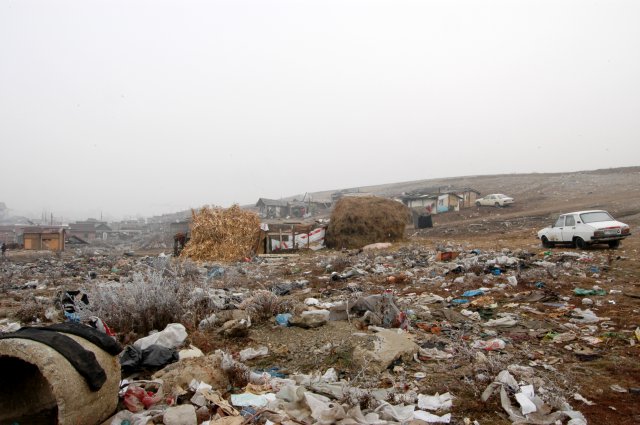ERRC and GLOC Call For Action on Evicted Romani Families in Romania
19 December 2011
 Cluj-Napoca, Budapest, 19 December 2011: The European Roma Rights Centre (ERRC) and Grupul de Lucru al Organizaţiilor Civice (GLOC) today sent a letter of concern to the Romanian authorities highlighting the ongoing problems of the Romani community based in Pata-Rât.
Cluj-Napoca, Budapest, 19 December 2011: The European Roma Rights Centre (ERRC) and Grupul de Lucru al Organizaţiilor Civice (GLOC) today sent a letter of concern to the Romanian authorities highlighting the ongoing problems of the Romani community based in Pata-Rât.
On 17 December 2010 almost 60 families were forcibly evicted from their homes close to the centre of Cluj-Napoca. They were moved to Pata-Rât, an industrial area close to the city’s rubbish dump.
One year on, new ERRC research shows that living standards for the community have declined. The ERRC conducted participatory research between September and November 2011 and found that housing conditions, access to work, education and healthcare have all been badly affected. Romani individuals face increased discrimination and are at risk from environmental health hazards.
Key findings include:
Almost a fifth (19%) of individuals lost their main source of income from formal and informal work, mainly due to the destruction of social networks and the distance from work.
The average monthly family income per capita has dropped by 33%. Families have less to spend on basic commodities including food, while transportation costs are much higher.
Only 5% of the respondents reported cases of discrimination and degrading treatment before relocation, rising to 25% after relocation.
89% of respondents described their health situation as well or very well before relocation, while only 46.5% reported themselves to be well after the eviction (none said very well).
In 2011 all the children due to be enrolled in primary school for the first time (that the ERRC is aware of) were rejected by mainstream schools on the basis of alleged insufficient space in the classrooms.
“Romanian authorities are failing their citizens at Pata-Rât by forcing them to live near a rubbish dump in substandard housing conditions,” said Dezideriu Gergely, ERRC Executive Director. “It is unacceptable to treat a community as if they’re rubbish, and this is a gross violation of human dignity.”
“We need national and local authorities to express clear political will to implement projects offering an inclusive urban development plan with an integrated housing project for marginalised Roma communities,” said Enikő Vincze, Founder Member of GLOC. “Besides providing decent housing, this would empower Roma citizens to become full members of our society.”
The ERRC and GLOC are making a number of recommendations to the local authorities. These include the need to plan and implement an alternative integrated housing project involving members of the community. The authorities should also conduct an eviction impact assessment to calculate the economic costs faced by the community members and provide compensation for all losses. In addition, the organisations are calling for an integrated approach from schools, the school inspectorate, doctors and the municipality to respond to the community’s needs.
For further information:
Sinan Gökçen
RRC Media and Communications Officer
sinan.gokcen@errc.org
+36.30.500.1324
Adrian Dohotaru
GLOC Representative
gloc.cluj@gmail.com
+40.74.007.0531




